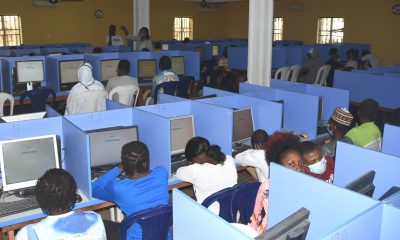Education
Ensure Stricter Cut-Off Marks For Education Courses – TRCN Urges JAMB

The Joint Admissions and Matriculation Board (JAMB) has been tasked on making admissions into colleges and faculties of education stricter to ensure the best brains enter the teaching profession.
Prof. Segun Ajiboye, Registrar, Teachers Registration Council of Nigeria (TRCN), made the call in Ibadan on Thursday, while presenting the 488th inaugural lecture of the University of Ibadan (UI).
The lecture is entitled: ‘Teaching: In the Classroom as a Regulator’.
Ajiboye said that lowering cut-off marks for education courses would have a negative impact on the quality of students who would eventually be teachers in the classrooms.
According to Ajiboye, a professor of Social Studies, Civic and Environmental Studies at UI, cut-off marks to education-related courses should rank among the highest.
“Admission into colleges of education and faculties of education in Nigeria should be stricter.
“The current practice is dangerous for the future of our education. Those who want to teach our children should be the best in our society and not the dregs.
“The hydra-headed crises of quality and quantity of teachers demand a strong policy response.
“Rebuilding the system should take into account how the once cherished vocation, the mother of all professions, should attract the best brains and retain them,” he said.
The TRCN boss noted that the COVID-19 pandemic had challenged the country’s education system.
He said that it was important that teacher education programmes be reviewed to meet modern-day challenges of globalisation and the post-COVID era.
“We must urgently do a review of our teacher education policy and programmes to produce teachers for the 21st century classroom.
“The rest of the world is not waiting for Nigeria. Professional training is critical, just as mastery of subject matter, teachers’ welfare and an environment that promotes learning.
“It is, therefore, important to stress the fact that the need for a review of our teacher education programme is long overdue.
“To meet the challenges of globalisation, efforts should be put in place for an immediate review of the curricular, methodology, motivation and resource components of our programme.
“Teaching, today, demands a lot more sophistication than previously. Therefore, pre-service teachers need to be adequately equipped to meet the classroom demands.
“It is, therefore, incumbent upon governments through their respective ministries to ensure that quality education is provided to our youth.
“For quality education to be achieved, there must be adequate quality teachers, who have gone through quality training; hence, the need to rebrand and re-profile the teacher.
“For this to be realised, there is the need to regulate the teaching profession with a view to ensuring the provision of quality teachers for quality teaching and learning,” Ajiboye said. (NAN)
Education
How female Medicine Degree Holder Abandoned Certificate for Carpentry- Bugaje

The Executive Secretary, National Board for Technical Education (NBTE), Prof. Idris Bugaje has expressed the need to promote inclusivity, especially for women and persons with disabilities in technical education.
Bugaje stated this in Abuja while assessing the impact of President Bola Tinubu’s administration after two years in office.
He appealed for greater gender inclusivity in vocational and technical education, stressing that deliberate policies such as scholarships and incentives could help bridge the gender gap.
In support of his position, Bugaje shared an inspiring story of a female medical doctor who abandoned her medical career to pursue carpentry.
“There is a story I want to share with you, about a girl who was interested in becoming a carpenter.
“The father was a carpenter and they were four children in the family, three boys and herself.
“Whenever she joined the boys to the workshop, the father would send her away, saying, `you are a girl, go back to the house, you are not supposed to be a carpenter’’.
“Without giving considerations to the passion of the young girl, the father sent her to a medical school.
“She graduated with the MBBS, went and did the one-year internship after graduation, and chose a role as a medical doctor.
“After that, she came back to the father, returned the MBBS certificate to him, and thanked him.
“Afterward, she told the father that her passion is in carpentry, not to practice as medical doctor,” Bugaje narrated
He added that after spending seven years on medical training, the father had no option but to send her to Turkey to learn how to make furniture.
Addressing cultural and societal barriers often faced by young women in technical fields, Bugaje appealed to parents to support their daughters’ interests in trades like plumbing, electrical installation, and carpentry.
He also called on policymakers to prioritise passion and skill development among youth, especially girls, noting that such encouragement could lead to greater innovation and self-reliance.
“If they want to become carpenters, ICT experts, or POP artists, allow them.
“In skills’ training, passion is very important. That’s what motivates children and helps them innovate.
“We need to harness these innovations if the country is to move forward and rise beyond being a third-world nation,” he said.
He emphasized the need to have deliberate policies to encourage women to come into TVET through scholarships and other incentives. (NAN)
Education
WAEC Apologies for Conducting English Exam Late, Cites Leakage Prevention

The West African Examinations Council (WAEC) has apologized for delay in conducting English Language Paper 2 in the ongoing 2025 West African Senior School Certificate Examination (WASSCE).
The took place on Wednesday evening.
In a statement by Moyosola Adesina, Acting Head of Public Affairs Department of
WAEC, the council said that it encountered challenges.
”While maintaining the integrity and security of our examination, we faced considerable challenges primarily due to our major aim of preventing leakage of any paper.
“We recognise the importance of timely conduct of examinations and the impact of this decision on candidates, their schools and parents, and we sincerely apologise for any inconveniences caused,” WAEC stated.
It said that it successfully achieved its objective but it inadvertently impacted the timeliness and seamless conduct of the examination.
“In spite of our best efforts, we encountered logistical hurdles, security concerns and socio-cultural factors that negatively influenced our operations,” WAEC said.
The council re-affirmed its commitment to upholding the highest standard in examination conduct, and pledged to continue to promote academic excellence. (NAN)
Education
FG vows full WAEC CBT shift by 2026 – Minister

The Minister of Education, Dr Tunji Alausa, has reaffirmed the Federal Government’s commitment to fully transitioning to Computer-Based Test (CBT) examinations for the West African Examinations Council (WAEC) and other exam bodies by 2026.
Dr Alausa made this known while monitoring the conduct of WAEC’s CBT examinations in Abuja on Wednesday.
He expressed optimism about Nigeria’s capacity to modernise its examination system and reduce widespread malpractice through digital innovation.
Commending WAEC’s initiative, the minister described the shift from traditional pen-and-paper exams to CBT as a historic and crucial step toward fairness and educational integrity.
“We are working very hard to eliminate fraud in our exam system, and WAEC is taking the lead,” he said.
Highlighting the advantages of CBT, Alausa noted that the system simplified the exam process while significantly curbing cheating.
“We now have clear evidence that when exams are done using technology, the level of fraud is minimised to almost zero,” he stated.
He further lauded WAEC’s internal safeguards, explaining that the CBT system was operated via a secured Local Area Network (LAN), making it “literally impossible” to hack.
According to the minister, by Nov. 2025, all WAEC multiple-choice exams will be conducted using CBT.
He added that essay questions and NECO examinations would follow suit by 2026.
On infrastructure and logistics, particularly in remote areas, Alausa acknowledged the challenges but assured that scalable solutions are in progress.
“Are we going to be ready to provide every single needed infrastructure by November? Absolutely not.
“But as we move into the future, we will be ready. We have to challenge ourselves as government,” he said.
He also addressed concerns over the logistics of conducting multiple exams.
“In WAEC, the average student takes about eight to nine papers.
“They do it over several days. Those are the logistics we, as administrators, have to work through, and we already are,” he explained.
The ongoing WAEC exams, which began on April 24, are scheduled to conclude on June 20, 2025.
A total of 1,973,253 candidates from 23,554 schools are participating. Of this number, 979,228 candidates are male, accounting for 49.63 per cent, while 994,025 candidates are female, making up 50.37 per cent.(NAN)




























